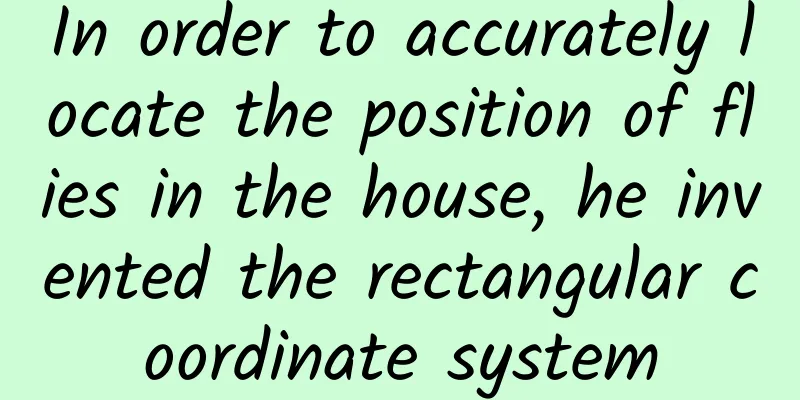In order to accurately locate the position of flies in the house, he invented the rectangular coordinate system

|
Produced by: Science Popularization China Produced by: Xiao Yi (Institute of the History of Natural Sciences, Chinese Academy of Sciences) Producer: Computer Network Information Center, Chinese Academy of Sciences “Fantasy is the wings of poets, and hypothesis is the ladder of science.” As Goethe said, science cannot be separated from thinking and questioning. The ever-developing science and technology is based on the unremitting exploration of predecessors. And the progress of science begins with bold conjectures and questions. What is the right way to think and question? This story of a young man from a small town may give you the answer. This young man from a small town was Rene Descartes. Through constant thinking and questioning, he put forward many theoretical hypotheses that have influenced later generations. Portrait of Descartes (Image source: Wikimedia) Between 1604 and 1612, Descartes studied at a school founded by the Society of Jesus, where he received an education focused on humanities, mathematics, religion and philosophy. Because the boy was weak, he specifically asked the principal to allow him not to participate in the morning religious services, and then use the morning time to lie in bed and think about life. His famous saying "I think, therefore I am" is a powerful proof of his lifelong practice of bold exploration and daring to question. As we all know, Descartes is a world-renowned philosopher, mathematician and physicist. It is said that he invented the rectangular coordinate system in order to facilitate the precise positioning of the position of a fly in a house. He used the distance of the fly from the ground or the roof and its distance from the adjacent wall to accurately locate the position of the fly at any time, and then used countless fly moving points to form a fly flight curve. In this way, he successfully paired algebra and geometry and founded analytic geometry. He is also known as the father of analytic geometry and proposed the famous cardioid equation. Image source: https://www.it610.com/article/5754526.htm Because he loved thinking too much when he was young, Descartes advocated doubting everything and published his first book, "The Method of the Proper Use of Reason and the Pursuit of Truth in Science" in 1637. In the book, Descartes said: "I will never accept anything as the truth until I have clearly understood the truth." This theory of "universal doubt" also made Descartes accidentally become the "father of modern philosophy." Before psychology officially became an independent discipline, it had always been lurking in philosophy, and Descartes' ideas had a profound impact on psychology, especially the development of physiological psychology. As the name suggests, physiological psychology studies both the body and the mind, and Descartes was the first person to combine the mind-body problem. Before Descartes, the theory of mind and body believed that the human body and mind can only interact in a one-way manner. The body is like a puppet, and the mind is the "person who controls the puppet." However, Descartes established a new viewpoint - mind-body dualism. Although the mind and body are different forms of existence, they interact with each other in the human body. The mind can affect the body, and vice versa. Influenced by the mechanical spirit of the time, Descartes compared our body structure to the robots he saw (I don’t know what he saw specifically, but it was definitely not what we call artificial intelligence today). He believed that there was a substance in our bodies called animal spirits that was unique to humans. Whenever animal spirits passed through the pipes of the human body, just like air was pressed into the pipes of an organ, our bodies would move, but this movement was affected by external forces, so he believed that this was an "unintentional reflex" activity. Descartes is therefore known as the founder of the reflex theory. The concept he proposed is the predecessor of modern behaviorist stimulus-response psychology, which is more than 200 years earlier than Pavlov's conditioned reflex theory that we are familiar with. It is also under the influence of Descartes' ideas that the scientific community has gradually formed a consensus that human behavior is predictable. Image source: https://www.zazzle.com In order to complete his hypothesis of the interaction between mind and body, Descartes needed to find a specific location in the body to explain how the mind and body interact. The pineal gland, the only single structure in the human brain that is not symmetrically distributed in the two hemispheres, fully meets the needs of Descartes' theoretical hypothesis. He believed that the movement of animal spirits would leave traces on the pineal gland, which would then cause the mind to feel; conversely, the mind could also leave some kind of impression on the pineal gland, which would affect the flow of animal spirits and thus affect the movement of the body. Does it sound a bit vague and fuzzy? That's because Descartes himself did not describe this part of the theoretical explanation clearly. After that, he further proposed two concept hypotheses. The first is called inherent concept, also called innate concept, which is developed from our innate mind. Under the influence of appropriate experience, we will perceive the existence of inherent concept; the second is called derived concept, also called acquired concept, which is some concept formed after external stimulation. His concept still affects the great debate about innate influence and acquired influence in psychology. Although we can find many bugs in the academic conclusions of scholars hundreds of years ago when we look back today, and some views even seem ridiculous today, their bold spirit of exploring science is worthy of recognition, and many of the hypotheses they put forward have also had a profound impact on the development of science in later generations. Unfortunately, just four months after Descartes accepted the offer from Queen Christina of Sweden to be the Queen's private tutor in philosophy and mathematics, he died on February 11, 1650 due to severe pneumonia. Undoubtedly, Descartes was able to persist in doubting everything and making bold assumptions. This kind of never-ending exploration of science is worth learning for you and me today. May we be able to uphold this enthusiasm, like Descartes, spark the "I think, therefore I am" in our thinking, and go further and further on the broad road of science. References: George, S. (1995). Descartes: An intellectual biography. Oxford, England: Clarendon Press. Schultz, Ye, Haosheng, & Yang, Wendeng. (2014). History of Modern Psychology. China Light Industry Press. Hegenhan, J., & Guo, B. (2004). Introduction to the History of Psychology. East China Normal University Press. Alanen, L. . (2009). Cartesian Scientia And The Human Soul. Brill. Clower, WT . (1998). The transition from animal spirits to animal electricity: a neuroscience paradigm shift. Journal of the History of the Neurosciences, 7(3), 201-218. Xi Lei, Zheng Shiyan, Liu Sishi, Chai Dan, & Zhang Xiaohan. (2018). History of Psychology. China Machine Press. Bonior, A. (2016). Psychology: Essential thinkers, classic theories, and how they inform your world. Zephyros Press. Hoselsall, Guo Benyu, & Wei Hongbo et al. (2015). Psychologists' Stories. The Commercial Press. |
<<: Have you noticed that there are fewer and fewer fireflies around us?
Recommend
The first electron beam was successfully accelerated. What exactly is HEPS?
March 14, 2023 The 13th Five-Year Plan for Nation...
Yingke Huajiao was ordered to rectify its video live streaming business and faced three pitfalls
Nowadays, live video streaming is really popular....
The world's first! Hydrogen powered
On September 21, a large blue mining vehicle was ...
How do brands like McDonald's and Starbucks find their loyal fans?
True consumer-centricity means focusing on the &q...
Practical Guide to Community Building and Operation
The next part of the practical guide to community...
Product operation tips: What are the methods to improve product conversion rate?
When we start promoting a product, the first thing...
Xiaohongshu promotion and traffic generation methods
Everyone is familiar with Xiaohongshu. It has dev...
Meizu feels so wronged, Samsung stops selling 8895 chips, Meizu is suddenly confused
Some time ago, the Samsung 8895 chip was released...
You can receive cash red envelopes from Alipay every day. Where can you receive Alipay red envelopes in physical stores every day?
December is here, and now there is good news. &qu...
Air purifiers are just transitional products: Even if the wind is strong, pigs may not fly
The stock market has been booming recently, with ...
Wuling Motors-Xiaohongshu advertising case!
Probably encouraged by the 38 promotion, I have r...
Offline event planning and traffic diversion skills!
Nowadays, the Internet dividend period has long d...
How to edit movies into short videos? How to learn how to make short videos and how to edit movie clips?
Recently, many friends have reported that they ha...
"Big cat"? "Freeloader"? Let's take a look at the ancient history of the "king of the grassland"
There is an animal that is both familiar and unfa...
1G bandwidth app server rental and hosting?
1G bandwidth app server rental and hosting? In th...









